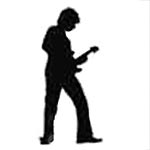Pop music and pirate radio stations mid-20th century UK

Restrictions of no personal music player
It must be difficult for later generations to understand the restrictions of there being no personal music players. If anyone had ever suggested that we would eventually have relatively cheap electronic devices for playing music that could be carried around with us and listened to with earpieces or headphones, we would have laughed in their faces.
As a teenager in the mid-to-late 1950s, I, like all teenagers, wanted pop music. In ordinary families like mine, the only music available was from the radio, known as the wireless. In the 1940s and early 1950s there was only one in the house, although by the mid 1950s we had acquired another smaller one in cream one for the kitchen.
With few exceptions the music on the Home Service, the Light Programme and the Third Programme (the only channels broadcast within the UK at the time) was not the pop music that appealed to teenagers. One notable exception was a programme of requests broadcast around mid-day on Sundays for the British Servicemen overseas - mainly it seemed in Germany. My mother was in the kitchen preparing food, making that radio unavailable to me. So I had to use the only other one, the large wooden radio in the room where my father was sitting reading the newspaper. Yet I was met with repeated demands from him to, "Turn it down!". Yet however much I did keep turning it down, it was never quiet enough for him. There was no compromise position.
Pirate radio stations
Fortunately I was able to listen to non-stop pop on the kitchen radio in the evenings, sitting at the kitchen table doing my homework while my parents were in the other room. How I could possibly have done homework effectively, with pop music blaring out, I cannot now imagine. But I did - and so did my friends. I suppose it was a sign of young brains.
The pop music came from what was called a pirate radio station, operating out of Luxembourg, and was appropriately called Radio Luxembourg. I suppose it was known as 'pirate' because it couldn't get a licence to broadcast in the UK. That was the prerogative of the BBC - the British Broadcasting Corporation. If you know, I would be pleased to hear from you.
From Radio Luxenburg to Radio Caroline
I understand that Radio Luxembourg was eventually closed down in the format I knew and its place was taken in the early 1960s by Radio Caroline which was broadcast from a ship - in other words still not permissible from within the UK. By then, though, I was no longer a teenager and my tastes had moved on. Also by the early 1960s, televisions had come into the homes of most working class families, and the Tops of the Pops show which began in 1964 was very popular with teenagers - but by then I was married and in work, and my priorities were different.
| sources | webmaster | contact |
Text and images are copyright
If you can add anything to this page or provide a photo, please contact me.



